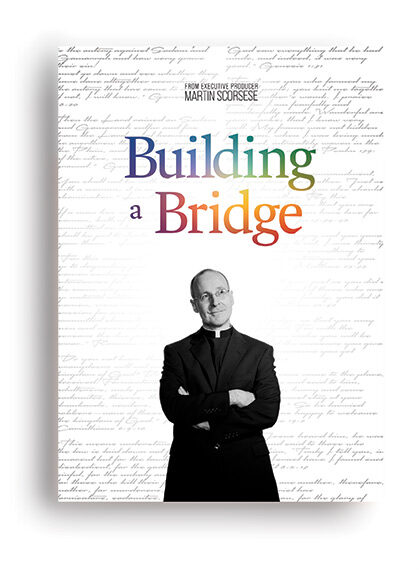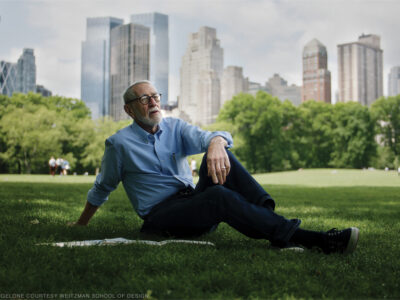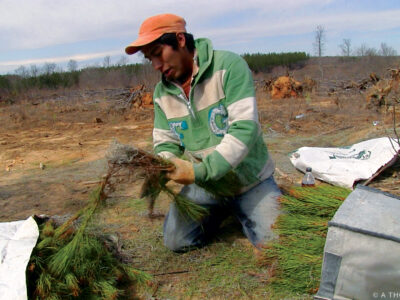Jesuit priest James Martin reflects on his path to LGBT-focused ministry.

Documentary, 2021, USA
Rev. James Martin, SJ, W’82 looks back on Gay Jeans Day now with “some embarrassment and some shame,” he says. Organized by a group called Gays at Penn during his time as a Wharton undergrad, the annual event encouraged students to wear jeans as a show of support for the LGBT community.
“I wore jeans every day of my life at Penn—except that day,” Martin recalls, “because I was so worried about people thinking that I was supporting that community. … It’s amazing how much my thinking has changed since then.”
Today Martin, who left the business world in 1988 to become a Jesuit priest, is well known for his advocacy work on behalf of LGBT Catholics [“Bless Me Father, For I Have Published,” Mar|Apr 2012]. His efforts are even at the center of a new documentary film, which takes its title from his 2017 book Building a Bridge. With Martin Scorsese as executive producer, the movie premiered at the Tribeca Film Festival in 2021, and landed on AMC+ and Sundance TV this past June.
“It was a little odd to be the subject of a documentary,” Martin admits. “And it took some time to get used to people following me around with cameras. But I know that film is a powerful medium, and that a thousand times more people will see this film than will have ever read my book or hear me speak. So I felt it was a great extension of the ministry.”
Though starring in a documentary was a new experience, Martin is no stranger to the spotlight. He’s been on screen with his pal Stephen Colbert multiple times and is often tapped for TV news interviews. He’s also a prolific author, and even narrates his own audiobooks, which include several New York Times bestsellers.
But his outspoken support of the LGBT community and calls for its respect and acceptance by the Catholic church are fairly recent. As a longtime editor for the national Catholic magazine America, Martin would occasionally pen columns about LGBT Catholics over the years—“primarily because I felt that there were very few people in the church advocating for them,” he says. Still, he wouldn’t have called himself a full-fledged advocate.
That changed after the June 12, 2016, mass shooting at Pulse, a gay nightclub in Orlando. The massacre left 49 dead and 53 injured—and to Martin’s distress, Catholic church officials mostly remained silent. As he explains in the film: “I couldn’t believe that there was only a handful of bishops that said anything … It just really angered me that even in death, [LGBT] people were largely invisible to the church.”
That anger prompted him to post a Facebook video (which has garnered 1.6 million views), which led to a series of lectures, which morphed into his 2017 book, Building a Bridge: How the Catholic Church and the LGBT Community Can Enter into a Relationship of Respect, Compassion, and Sensitivity, which inspired the documentary film.
When Martin agreed to participate in the movie, “I kept thinking about a young LGBT person who’s trying to find his or her or their way in the church watching this film, and feeling more welcome in their own church,” he says.
He also saw the chance to reveal “a slice of the Catholic church that most people don’t know about.” The film includes the stories of a Catholic mother whose son died at Pulse, a Catholic family with three teenaged LGBT children, and several people working in the LGBT ministry Out at Saint Paul. Martin hopes that church leaders will see these emotional stories and open up to understanding the experiences of LGBT people.
For now, there are still plenty of people both inside and outside of the church who decry Martin’s work. They often show up to protest when he’s giving a talk, scream at him on the street, or launch campaigns to attack him on social media, where he is a regular tweeter, Facebooker and Instagrammer.
“I mean, I get death threats,” he says, “but I also get a lot of what I call ‘Catholic death threats,’ which are people saying, ‘I hope you die and go to hell so you can find out how wrong you are.’”
“For the most part,” he adds, “the opposition and the hate online and the protests don’t really bother me any longer. Because I know I have the support of the Pope and the support of the Jesuits, and that it’s important work to be done. And so what if some anonymous person with 10 followers on Twitter doesn’t like me.”
That’s right: the Pope. In 2017, Pope Francis appointed Martin as a consultant to the Vatican’s Secretariat for Communications. And in what Martin calls a “really life-changing” experience, he received a half-hour private audience with Francis in late 2019 to discuss LGBT Catholics.
“At the end of the meeting, he said, ‘I want you to continue this ministry,’” Martin recalls. The Vatican even sent out a photo of the two men and listed the meeting on the Pope’s official schedule. “That’s the Vatican’s way of communicating the Pope’s approval of this ministry,” Martin says.
As he works on writing his 17th book—number 16, another Times bestseller titled Learning to Pray, came out last year—Martin is also continuing his LGBT advocacy, just as the Pope urged him to. He’s created a new web resource for LGBT Catholics, and on June 24–25 held his first LGBT ministry conference at Fordham University.
“God is what keeps me going,” he says. “This is all an outgrowth of my life as a Jesuit and my commitment to Jesus and the kind of ministry he did, which was reaching out to those who are rejected, excluded, or marginalized. I think this is where he would be today. And I think, through the spirit, this is where he is.”
Martin remains hopeful that more Catholics will eventually come to share those views, or at least to recognize and accept their LGBT members. “Now I’d be happy to wear jeans on Gay Jeans Day,” he says. “So yeah, people can change.”
—Molly Petrilla C’06





Sr. Jeannine Gramick’s e-mail is [email protected].
Fr. Harry Winter
Fr. Jim Martin was moved by the devastation of the mass shooting at Pulse, a gay night club in Orlando, in 2016. A Catholic nun, who was a grad student at the University of Pennsylvania, as I was in the early 1970s, was moved to devote her life to LGBTQ ministry when she met LGBT Catholics at the University in 1971. Pope Francis sent her a congratulatory letter after her 50 years in LGBTQ ministry. You might want to interview her. Her name is Sister Jeannine Gramick. She received her Ph.D. from the University in 1975.
Fr. Harry Winter